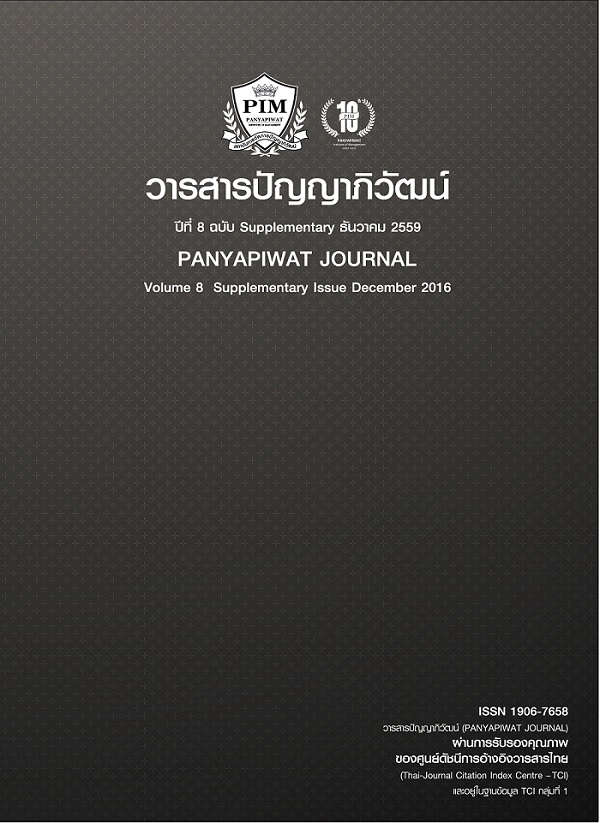SMALL AND MEDIUM FAMILY ENTREPRENEUR LEADERSHIP BEHAVIOR AND ENTERPRISE PERFORMANCE
Main Article Content
บทคัดย่อ
This paper reviews the research progress of the relationship between the leadership behavior and the performance of the Small and Medium Family Entrepreneurs (SMFE) in recent years. First, this paper describes the definition of Small and Medium Enterprises (SME) and Small and Medium Family Enterprises (SMFE), reviews the research history, current situation and theoretical of Small and Medium Family Enterprises. Secondly, the literature is reviewed on the Small and Medium Family Enterprise (SMFE)'s leadership behavior, the SMFE management model, the SMFE enterprise performance, the relationship between corporate governance and corporate performance. Finally, some research findings conclusions about leadership behavior, governance and corporate performance are showed. The article briefly describes the problems to be further studied in the end.
Article Details
“ข้าพเจ้าและผู้เขียนร่วม (ถ้ามี) ขอรับรองว่า บทความที่เสนอมานี้ยังไม่เคยได้รับการตีพิมพ์และไม่ได้อยู่ระหว่างกระบวนการพิจารณาลงตีพิมพ์ในวารสารหรือแหล่งเผยแพร่อื่นใด ข้าพเจ้าและผู้เขียนร่วมยอมรับหลักเกณฑ์การพิจารณาต้นฉบับ ทั้งยินยอมให้กองบรรณาธิการมีสิทธิ์พิจารณาและตรวจแก้ต้นฉบับได้ตามที่เห็นสมควร พร้อมนี้ขอมอบลิขสิทธิ์บทความที่ได้รับการตีพิมพ์ให้แก่สถาบันการจัดการปัญญาภิวัฒน์หากมีการฟ้องร้องเรื่องการละเมิดลิขสิทธิ์เกี่ยวกับภาพ กราฟ ข้อความส่วนใดส่วนหนึ่งและ/หรือข้อคิดเห็นที่ปรากฏในบทความข้าพเจ้าและผู้เขียนร่วมยินยอมรับผิดชอบแต่เพียงฝ่ายเดียว”
เอกสารอ้างอิง
Astrachan, J. H., Klein. S. B. & Smyrnios, K. X. (2002). The F-PEC scale of family influence: A proposal for solving the family business definition problem. Family Business Review, 15(1), 45-58.
Avila. R. A., Fern, E. F. & Mann, O. K. (1988). Unraveling criteria for assessing the performance of sales people: A causal analysis. Journal of Personal Selling and Sales Management, 8, 45-54.
Baker G., Gibbons, R. & Murphy, K. J. (1999). Informal authority in organizations. Journal of Law Economics & Organization, 15(1), 56-73.
Baker, G., Gibbons, R. & Murphy, K. J. (2002). Relational contracts and the theory of the enterprise.Quarterly Journal of Economics, 117(1), 39-81.
Becker, H. S. (1960). Notes on the Concept of Commitment. American Journal of Sociology, 66,32-42.
Bass, B. M. (1990). Bass and Stogdills handbook of leadership: Theory, research, and managerial application. New York: Free Press.
Birley, S. & Godfrey, A. (1999). The family and the business. Long Range Planning, 32(6), 598-608.
Borman, W. C. & Motowidl, S. J. (1993). Expanding the criterion domain to include elements of contextual performance. Personnel Selection in Organizations. San Francisco: Josses-Bass.
Carson. S. J., Madhok, A. & Wu, T. (2006). Uncertainty, opportunism, and governance: The effects of volatility and ambiguity on formal and relational contracting. Academy of Management Journal, 49(5), 1058-1077.
Charles, J., Goetz, C. J. & Scott, R. E. (1981). Principles of Relational Contracts. Virginia Law Review, 67(6), 1089-1150.
Chen, X. & Farh, J. L. (1999). The Effectiveness of Transactional and Transformational Leader Behaviors in Chinese Organizations: Evidence from Taiwan. AOM Conference paper. Chicago.
Chua, J. H., Chrisman, J. J. & Sharma, P. (1999). Defining the family business by behavior. Entrepreneurship, Theory and Practice, 23(4), 19-37.
Conger, J. A. & Kanungo, R. N. (1987). Toward a Behavioral Theory of Charismatic Leadership in Organizational Settings. Academy of Management Review, 12, 637-647.
Covin, J. G. & Slevin, D. P. (2002). The entrepreneurial imperatives of strategic leadership. In M. A. Hitt, R. D. Ireland, S. M. Camp & D. L. Sexton (Eds.). Strategic entrepreneurship: Creating a new mindset. (pp. 309-327). Oxford: Blackwell Publishers.
Dyer, W. G. & Handler, W. (1994). Entrepreneurship and family business: exploring the connections. Entrepreneurship Theory and Practice, 3, 71-83.
Fox, M., Nilakant, V. & Hamilton, R. T. (1996). Managing succession in family-owned businesses. International Small Business Journal, 15(1), 15-25.
Handler, W. (1989). Methodological issues and considerations in studying family businesses. Family Business Review, 2(3), 257-276.
Lu, L. et al. (2003). Family enterprise governance structure three ring model. Management of the economy:new management, 2, 1-11.
Mathieu, J. E. & Zajac, D. M. (1990). A review and meta-analysis of the antecedents, correlates and consequences of organizational commitment. Psychological Bulletin,108, 171-194.
Redding, G. & Wong. G. Y. (1986). The psychology of Chinese organizational behavior. In Bond, M. H. (Ed.). The psychology of Chinese people. (pp.267-295).
Hong Kong: Oxford University Press.Redding, S. G. (1990). The Spirit of Chinese Capitalism. New York: Walter de Gruyter.
Sharma, P. (2004). An Overview of the Field of Family Business Studies: Current Status and Directions for the Future. Family Business Review, 17(1), 1-36.
Tsui, A. S. et al. (2006). Unpacking the relationship between CEO leadership behavior and organizational culture. The Leadership Quarterly,17(2), 113-137.
Wang H., Xin, R. & Xu, S. (2006). CEO leadership behavior of Chinese enterprises and its impact on business performance. Management World, 4, 17-19.
Wang, J. (2002). A study of interpersonal harmony, leadership behavior and effectiveness. The thesis of master’s degree thesis, Kaohsiung Medical University.
Wu, Z. & Wu, X. (2007). Study the relationship between transformational leadership, organizational citizenship behavior and psychological empowerment. Journal of management science, 10(5).
Wang, L. & Yao, X. (2002). Chinese family enterprise: current situation, problems and solutions. Beijing: Enterprise management publishing house.
Zhang, Y. (2002). A preliminary study on the governance structure of Chinese family enterprise. Science and technology progress and countermeasures, 23-25.
Zheng, B. (2000). Parents’ Leadership: Thinking again. The study of native psychology, 219-227.Zhou, H. & Long, L. (2005). Temper justice with mercy, win people by virtue, A review of the research on the leadership of parents. Progress in Psychological Science, 13(2), 227-238.
Zhou, L. (2005). The organization evolution of Chinese family enterprise during the transition period. Beijing: economic management press.


